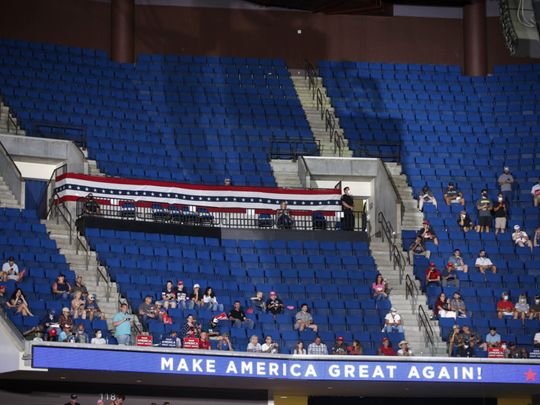
US President Donald Trump’s campaign promised huge crowds at his rally in Tulsa, Oklahoma, but it failed to deliver. Hundreds of teenage TikTok users and K-pop fans say they’re at least partially responsible.
Brad Parscale, the chairman of Trump’s re-election campaign, posted on Twitter on Monday that the campaign had fielded more than 1 million ticket requests, but reporters at the event noted the attendance was lower than expected. The campaign also canceled planned events outside the rally for an overflow crowd that did not materialise.
Tim Murtaugh, the Trump campaign’s spokesman, said protesters stopped supporters from entering the rally, held at the BOK Center, which has a 19,000-seat capacity. Reporters present said there were few protests.
TikTok users and fans of Korean pop music groups claimed to have registered potentially hundreds of thousands of tickets for Trump’s rally as a prank. After @TeamTrump tweeted asking supporters to register for free tickets using their phones June 11, K-pop fan accounts began sharing the information with followers, encouraging them to register for the rally — and then not show.
The trend quickly spread on TikTok, where videos with millions of views instructed viewers to do the same, as CNN reported Tuesday. “Oh no. I signed up for a Trump rally, and I can’t go,” one woman joked, along with a fake cough, in a TikTok posted June 15.
Thousands of other users posted similar tweets and videos to TikTok that racked up millions of views. Representatives for TikTok did not immediately respond to requests for comment.
“It spread mostly through Alt TikTok — we kept it on the quiet side where people do pranks and a lot of activism,” said YouTuber Elijah Daniel, 26, who participated in the campaign. “K-pop, Twitter and Alt TikTok have a good alliance where they spread information amongst each other very quickly. They all know the algorithms and how they can boost videos to get where they want.”
Many users deleted their posts after 24 to 48 hours in order to conceal their plan. “The majority of people who made them deleted them after the first day because we didn’t want the Trump campaign to catch wind,” Daniel said. “These kids are smart, and they thought of everything.”
Twitter users Saturday night were quick to declare the social media campaign’s victory. “Actually you just got ROCKED by teens on TikTok,” Rep. Alexandria Ocasio-Cortez of New York tweeted in response to Parscale, who had tweeted that “radical protestors” had “interfered” with attendance.
“The teens of America have struck a savage blow against @realDonaldTrump,” added Steve Schmidt, a longtime Republican strategist.
Mary Jo Laupp, a 51-year-old from Fort Dodge, Iowa, said she had been watching Black TikTok users express their frustration about Trump hosting his rally on Juneteenth. (The rally was later moved to June 20.) She “vented” her own anger in a late-night TikTok video June 11 - and provided a call to action.
She recommended that people who “want to see this 19,000-seat auditorium barely filled or completely empty go reserve tickets now and leave him standing there alone on the stage,” Laupp said in the video.
When she checked her phone the next morning, Laupp said, the video was starting to go viral. It has more than 700,000 likes, she added, and more than 2 million views.
The effort to deprive Trump of a large crowd spread from Twitter and TikTok across multiple social media platforms, including Instagram and Snapchat.









